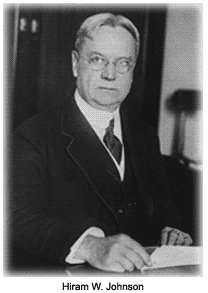 Hiram Warren Johnson's first job was as a shorthand reporter and stenographer in a law firm, which sparked his interest in the subject. In 1888, Johnson was admitted to and attended the University of California at Berkeley, where he earned his law degree. In 1902, he moved to San Francisco, where he served as an assistant district attorney. In the midst of his legal practice, Johnson became increasingly active in reform politics, taking on an anti-corruption mantle.
In 1910, he became part of the Lincoln-Roosevelt Party and then founded the United States Progressive Party in 1912. He served as governor of California between 1911 and 1917, when he led successful fights for institution of initiative, referendum and recall laws, the direct primary election, the eight-hour work day for women and children, the Workers Compensation Act, pensions for retired teachers, and more government control of the railroads and utilities.
It was not until 1919 that Johnson became the presumptive leader of the Progressives, due to the death of Theodore Roosevelt. As a U.S. Senator, Johnson proved to be popular and was re-elected four times. After serving for nearly 30 years in government, he died on August 6, 1945, the same day the atomic bomb was dropped on Hiroshima.
Hiram Warren Johnson's first job was as a shorthand reporter and stenographer in a law firm, which sparked his interest in the subject. In 1888, Johnson was admitted to and attended the University of California at Berkeley, where he earned his law degree. In 1902, he moved to San Francisco, where he served as an assistant district attorney. In the midst of his legal practice, Johnson became increasingly active in reform politics, taking on an anti-corruption mantle.
In 1910, he became part of the Lincoln-Roosevelt Party and then founded the United States Progressive Party in 1912. He served as governor of California between 1911 and 1917, when he led successful fights for institution of initiative, referendum and recall laws, the direct primary election, the eight-hour work day for women and children, the Workers Compensation Act, pensions for retired teachers, and more government control of the railroads and utilities.
It was not until 1919 that Johnson became the presumptive leader of the Progressives, due to the death of Theodore Roosevelt. As a U.S. Senator, Johnson proved to be popular and was re-elected four times. After serving for nearly 30 years in government, he died on August 6, 1945, the same day the atomic bomb was dropped on Hiroshima.